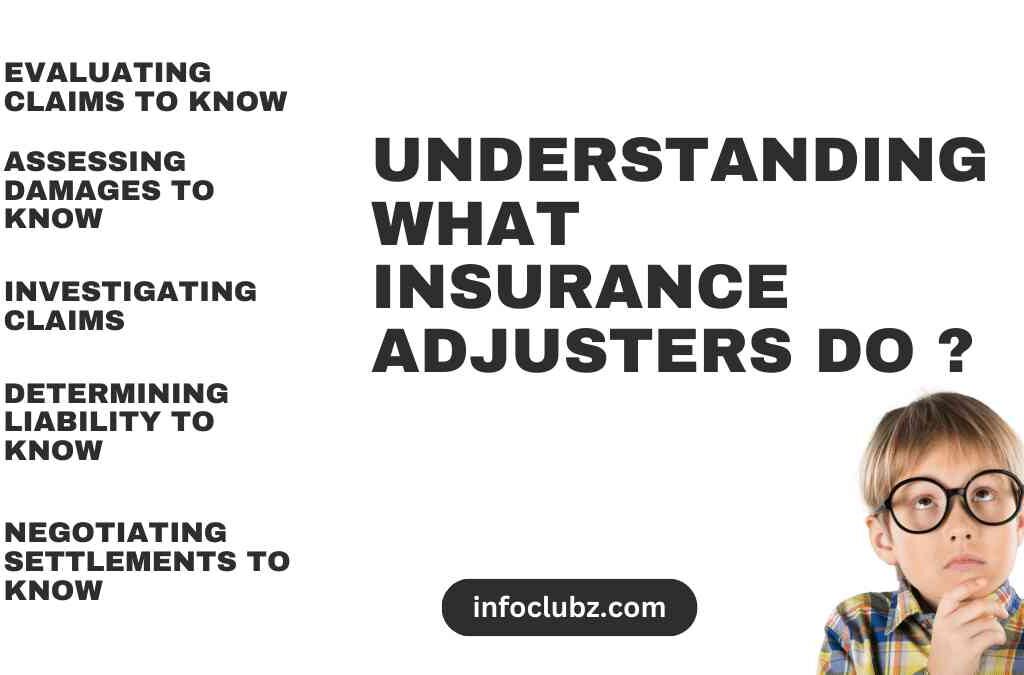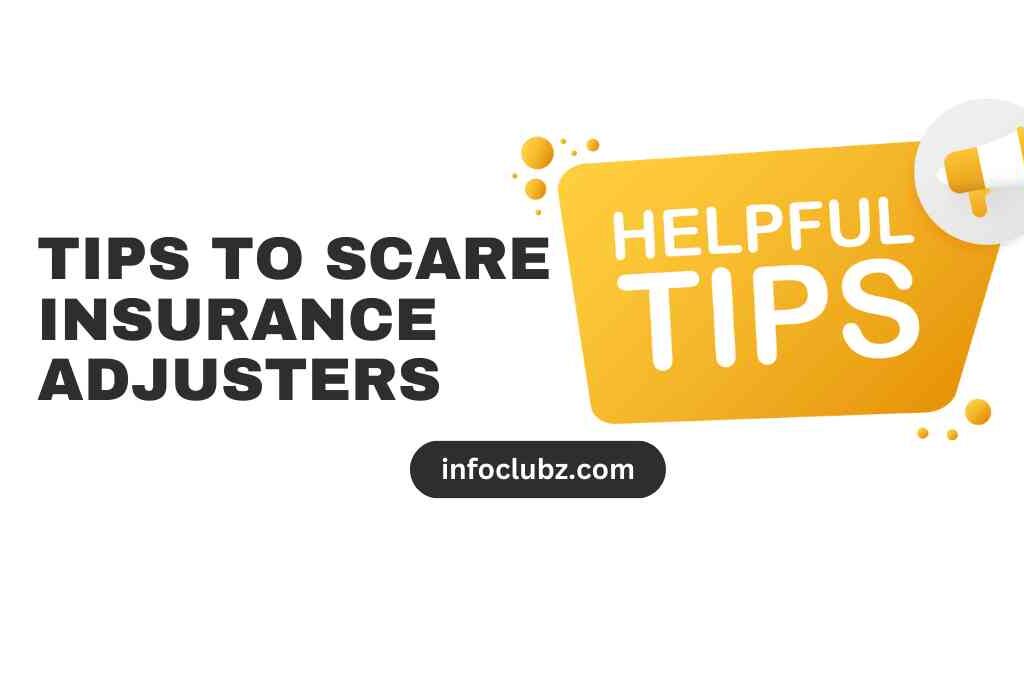Insurance adjusters play a crucial role in the claims process, assessing damages and determining payouts. However, there may be instances where you feel the need to assert your rights and maximize your insurance benefits. This article will guide you on how to scare insurance adjusters effectively, ensuring your claims are handled swiftly and in your favor.
- How to scare insurance adjuster?
- Understanding the Role & Goals of an Insurance Adjuster
- Understanding What Insurance Adjusters Do
- Things to Avoid Saying to an Insurance Adjuster
- Reasons to Scare Insurance Adjusters
- Tips to Scare Insurance Adjusters
- Know how adjusters may try to reduce compensation
- Mistakes to Avoid : While Scaring Insurance Adjusters
- Review a settlement offer attentively
- Conclusion : How to Scare Insurance Adjuster
- FAQs : How to Scare Insurance Adjuster
How to scare insurance adjuster?
When dealing with insurance claims, it’s essential to understand the role of insurance adjusters and the reasons why you might want to scare them. if you have question “How to Scare Insurance Adjuster & Get a Fair settlement 100% Sure” in your mind then by following the tips outlined in this article, you can increase your chances of receiving a fair settlement and expedite the claims process.

Understanding the Role & Goals of an Insurance Adjuster
Who are Insurance Adjusters?
Insurance adjusters are professionals employed by insurance companies to investigate and assess the value of claims made by policyholders. They evaluate the extent of damages, determine liability, and negotiate settlements on behalf of the insurance company.
Their Role and Responsibilities
Insurance adjusters are responsible for collecting evidence, interviewing parties involved, and reviewing policy terms and conditions to evaluate the validity and value of a claim. Their primary goal is to protect the interests of the insurance company while ensuring a fair resolution for all parties.
Understanding What Insurance Adjusters Do
Insurance adjusters play a vital role in the insurance claims process. They are responsible for evaluating claims, assessing damages, and determining the appropriate amount of compensation to be paid to policyholders. By understanding what insurance adjusters do, you can navigate the claims process more effectively and ensure you receive fair treatment.

Evaluating Claims to know
Insurance adjusters are tasked with evaluating the validity and legitimacy of insurance claims. They review the details of the incident or loss, assess the damages or injuries sustained, and determine whether the claim falls within the coverage provided by the policy.
Assessing Damages to know
One of the primary responsibilities of insurance adjusters is to assess the extent of damages caused by an insured event. Whether it’s property damage, bodily injury, or any other type of loss covered by the policy, adjusters examine the evidence, such as photographs, repair estimates, and medical records, to estimate the value of the damages.
Investigating Claims
Insurance adjusters conduct investigations to gather all relevant information related to the claim. They may interview witnesses, review police reports or medical records, inspect damaged property, and consult experts if necessary. The purpose of the investigation is to ensure that the claim is valid and supported by credible evidence.
Determining Liability to know
In cases where liability is disputed, insurance adjusters play a crucial role in determining who is at fault for the incident or loss. They analyze the available evidence, consider applicable laws and policy provisions, and make a determination regarding liability. This assessment helps in deciding the extent to which the insurance company will accept responsibility for the damages.
Negotiating Settlements to know
Once the evaluation and investigation are complete, insurance adjusters engage in negotiations with the policyholder or their legal representative. Their goal is to reach a fair and reasonable settlement that compensates the policyholder for their losses while also aligning with the coverage limits and terms of the insurance policy.
Managing Claims Process to know
Insurance adjusters act as the main point of contact between the policyholder and the insurance company throughout the claims process. They guide policyholders through the necessary steps, assist with paperwork, and provide updates on the progress of the claim. Adjusters ensure that the claim is processed efficiently and in compliance with the company’s policies and procedures.
How to Scare Insurance Adjuster & Get a Fair settlement 100% Sure
Resolving Disputes to know
In situations where there are disagreements or disputes between the policyholder and the insurance company, adjusters work to facilitate a resolution. They may engage in further investigations, consult with supervisors or legal teams, or even participate in mediation or arbitration processes to reach a mutually agreeable outcome.
Understanding the role of insurance adjusters is essential when dealing with insurance claims. By being aware of their responsibilities, you can effectively communicate, provide necessary documentation, and navigate the claims process more smoothly. Ultimately, the goal is to achieve a fair and satisfactory settlement for your insurance claim.

Things to Avoid Saying to an Insurance Adjuster
When dealing with an insurance adjuster during the claims process, it’s important to be cautious about the information you provide and how you communicate. Insurance adjusters are trained professionals representing the insurance company’s interests, and certain statements or remarks could potentially harm your claim. To ensure a smooth and favorable claims experience, here are some things to avoid saying to an insurance adjuster:

Admitting Fault to know
Avoid admitting fault or accepting blame for the incident without a clear understanding of the facts and liability. Even a simple apology or expression of regret can be interpreted as an admission of guilt and may negatively impact your claim.
Speculating or Guessing to know
Refrain from speculating or guessing about the cause of the incident or the extent of damages. Stick to providing factual information based on your observations and knowledge. Speculation can be misinterpreted and may weaken your position during negotiations.
Exaggerating Claims to know
While it’s essential to provide accurate information about the damages or injuries sustained, exaggerating or embellishing the details can undermine your credibility. Stick to the facts and avoid exaggerations that could be easily refuted by the insurance company’s investigation.
Agreeing to Recorded Statements without Legal Counsel
Be cautious about providing recorded statements without consulting with an attorney. Insurance adjusters may request recorded statements early in the process, but it’s within your rights to seek legal advice before agreeing to such requests. This ensures that you have a clear understanding of the implications and potential risks involved.
How to Scare Insurance Adjuster & Get a Fair settlement 100% Sure
Settling Too Quickly to know
Avoid settling the claim hastily, especially if you haven’t fully assessed the damages or understood the long-term implications. Rushing into a settlement may result in inadequate compensation for your losses. Take the time to gather all necessary information and consult with experts or legal professionals if needed.
Making Unrecorded Agreements
Any agreements or promises made with an insurance adjuster should be documented and recorded in writing. Verbal agreements are difficult to enforce and can lead to misunderstandings or disputes later on. Always request written confirmation of any agreements reached during the claims process.
Providing Unnecessary Personal Information
Exercise caution when providing personal information to insurance adjusters. Stick to sharing only relevant details related to the incident or the claim. Avoid divulging unnecessary personal or sensitive information that is unrelated to the claim.
Accepting the Initial Offer without Reviewing
Insurance adjusters often start with a lower settlement offer to gauge your response. It’s crucial to carefully review and assess any settlement offers before accepting or negotiating further. Consult with professionals, such as attorneys or independent appraisers, to ensure you receive a fair and adequate settlement.
By avoiding these pitfalls and being mindful of what you say to an insurance adjuster, you can protect your rights and enhance your chances of a successful insurance claim.

Reasons to Scare Insurance Adjusters
There are several reasons why you may want to scare insurance adjusters:
Maximize Insurance Payouts
By intimidating insurance adjusters, you can potentially influence them to offer a higher settlement amount. This is particularly important when your claim involves significant damages or injuries that have impacted your life significantly.
Speed up Claim Process to know
Scaring insurance adjusters can prompt them to prioritize your claim and expedite the processing time. This can be advantageous if you require immediate financial assistance to cover medical bills, property repairs, or other expenses resulting from the incident.

Resolve Disputes to know
If you find yourself in a dispute with an insurance adjuster regarding the valuation or coverage of your claim, scaring them can signal your determination to fight for a fair resolution. It can push them to reevaluate their position and negotiate more actively.
Tips to Scare Insurance Adjusters

Before delving into the methods of scaring insurance adjusters, it’s crucial to understand their role and responsibilities. Insurance adjusters are representatives of insurance companies who assess damages, investigate claims, and negotiate settlements. They aim to protect the interests of the insurer while adhering to legal and ethical guidelines.
To effectively scare insurance adjusters, consider the following tips:
Gather Evidence to know
Collect and document all relevant evidence, including photographs, videos, witness statements, and any other supporting documents that substantiate your claim. Presenting strong evidence can intimidate insurance adjusters and demonstrate your preparedness to fight for a fair settlement.
Know Your Policy
Thoroughly review your insurance policy to understand your rights, coverage limits, and exclusions. By familiarizing yourself with the policy details, you can confidently challenge any attempts by the adjuster to undervalue or deny your claim.
Hire an Attorney
Engaging an experienced attorney who specializes in insurance claims can significantly impact the outcome of your case. An attorney will advocate for your rights, handle negotiations with the insurance adjuster, and ensure that you receive fair compensation.
Be Persistent
Maintain regular communication with the insurance adjuster, expressing your commitment to resolving the claim promptly and fairly. Follow up on any outstanding issues and request updates on the progress of your claim. Your persistence can unsettle the adjuster and emphasize your determination.
Use Social Media
Utilize social media platforms to share updates and information about your claim. By creating public awareness, you can put additional pressure on the insurance company and its adjusters to handle your case more seriously.
How to Scare Insurance Adjuster & Get a Fair settlement 100% Sure
Understand your policy:
Familiarize yourself with the terms and conditions of your insurance policy. This will help you understand your rights and the coverage you are entitled to.
Communicate clearly:
Express your concerns and issues to the insurance adjuster in a clear and concise manner. Provide them with the necessary information and be prepared to answer any questions they may have.
Be persistent:
If you believe you are not receiving a fair assessment or resolution, politely request to speak with a supervisor or escalate your complaint within the insurance company. Follow their prescribed procedures for dispute resolution.

Know how adjusters may try to reduce compensation
After learning how insurance adjusters work, it’s time to delve a little deeper and examine some of the strategies they could employ to reduce settlement offers.
The following methods and tricks are employed to aggravate plaintiffs and raise the possibility that they may consent to a less settlement:
- Avoid calling: This typical strategy is frequently utilised in the hopes that the claimant would merely “go away” or forget about their claim.
- Delay in taking action: Some insurance adjusters hold off taking action to aggravate claimants and increase the likelihood that they will accept a lowball offer.
- Ask for further information: The adjuster is using this as a stalling technique by stating that they need additional information to process your claim.
- A lowball offer is one that an adjuster makes that is significantly less than what you anticipate or what you require to pay for charges.
- Encourage or scare you: Some adjusters could attempt to pressure you into accepting a lowball settlement by stating that they will soon remove it from the table.
Mistakes to Avoid : While Scaring Insurance Adjusters
While it’s crucial to assert your rights when dealing with insurance adjusters, there are certain mistakes you should avoid:
Exaggerating Claims
While you want to maximize your insurance payout, it’s important to remain truthful and accurate in your claims. Exaggerating damages or injuries can undermine your credibility and potentially lead to legal consequences.
Lying or Misrepresenting Information
Providing false information or deliberately misrepresenting facts can have severe consequences, including claim denial and legal repercussions. Always be honest and provide complete information to ensure a fair and transparent claims process.
Acting Aggressively
While it’s important to assert your rights, acting aggressively or resorting to harassment can harm your case. Maintain a professional and respectful demeanor when interacting with insurance adjusters to preserve the integrity of your claim.
Review a settlement offer attentively

Inducing fear or anxiety can occasionally be accomplished most effectively by a claimant’s silence. At first, this could appear counterintuitive. But keep in mind that one of an insurance adjuster’s objectives is to promptly resolve disputes. Therefore, if they make you a settlement offer and you don’t accept it right away, they might start to worry that you will.
Conclusion : How to Scare Insurance Adjuster
In How to Scare Insurance Adjuster this article we learned about Scaring insurance adjusters can be a strategic approach to ensure your claim receives the attention and compensation it deserves. However, it is crucial to strike a balance between assertiveness and professionalism, always adhering to ethical and legal guidelines. By employing tactics such as psychological tricks, legal actions, social media engagement, evidence manipulation, and unpredictability, you can unsettle insurance adjusters while safeguarding your rights and maximizing your claim.
FAQs : How to Scare Insurance Adjuster
Can scaring insurance adjusters guarantee a higher settlement?
While scaring insurance adjusters can create a sense of urgency and potentially lead to higher settlement offers, there are no guarantees. The ultimate settlement amount depends on various factors, including the specifics of your case, evidence, and negotiations.
Should I hire an attorney to scare an insurance adjuster?
Hiring an attorney can be beneficial in complex cases or when facing resistance from insurance adjusters. An attorney can guide you through the legal aspects and ensure your rights are protected, which may in turn unsettle the adjuster.
How can social media be used to scare insurance adjusters?
Sharing your experiences and frustrations on social media platforms can generate public attention and put pressure on insurance adjusters to address your concerns promptly and fairly. It highlights their actions or inactions, potentially causing reputational damage.
What should I do if scaring the insurance adjuster doesn't work?
If scaring the insurance adjuster does not lead to a satisfactory resolution, it may be necessary to explore other options, such as involving a mediator or pursuing legal action. Consulting with an attorney can provide guidance on the best course of action in your specific case.
Can scaring an insurance adjuster backfire?
While assertiveness can be beneficial, it's important to strike a balance. Intimidating an insurance adjuster excessively may lead to strained negotiations or even a refusal to settle your claim. Approach the situation strategically and consider professional assistance if needed.
Should I always hire an attorney to deal with insurance adjusters?
While hiring an attorney is not mandatory, it can significantly enhance your chances of a successful outcome. Attorneys have expertise in dealing with insurance companies and can navigate complex legal matters on your behalf.
How can social media help in scaring insurance adjusters?
By sharing updates and information about your claim on social media platforms, you create public awareness and potentially put additional pressure on insurance adjusters to handle your case diligently.
Are insurance adjusters allowed to use surveillance to investigate claims?
Yes, insurance adjusters may use surveillance methods to investigate claims. However, they must follow legal guidelines and respect privacy laws while doing so.
Can I negotiate with an insurance adjuster on my own?
Yes, you can negotiate with an insurance adjuster on your own. However, keep in mind that adjusters are skilled negotiators representing the insurance company's interests. Having legal representation can provide you with a stronger position during negotiations.
How to Scare Insurance Adjuster & Get a Fair settlement 100% Sure


1 Comment
Pingback: City of Mansfield Income Tax : "Prosperous Revenue" - Info Clubz